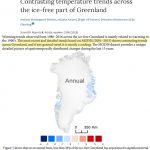- Joined
- Jan 3, 2014
- Messages
- 16,501
- Reaction score
- 3,829
- Location
- Sheffield
- Gender
- Male
- Political Leaning
- Other
That equation from the Internet adequately showed the folly of your statement earlier --- "If so then there will be very little difference in melt time". Temperatures matter, and I would advise that you choose your words more wisely.
How bad at maths do you have to be to get to your point?
The equation has no time varable in it. Time is not a factor in the equation.
Try not to fail so badly.



